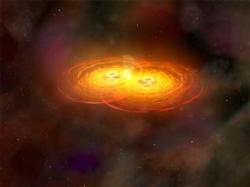L
levass1o
Guest
Hi space gang,
What is weird for me is that my thoughts on the black hole collision matter crush in the very early stages:
As per special relativity theory the body gains mass with the speed and notably near the speed of light.
As per the Escape Velocity, two objects bound in a gravitational rotation -- the closer they come the more speed should they have to retain their orbits. Basically we all know the gas accreting into black hole speeds up to almost light speeds and emits...whatever possible in a process.
Having the above 2 rules in mind it is hard to imagine how can the pair of black holes collide.....especially for me as for a side observer. Because of their infinitely small sizes we can assume holes can come infinitely close to each other which will mean huge speed gains for both while at close distances. Huge speeds mean huge mass gains. Up to infinite number of times. So....according to Einstein, colliding black holes should swallow the entire galaxy if not the Universe in their infinite mass gain.
Which we don't see happening. :roll: Much more likely I have a simple mistake somewhere. Could you please guys point where and explain how the collision goes?
What is weird for me is that my thoughts on the black hole collision matter crush in the very early stages:
As per special relativity theory the body gains mass with the speed and notably near the speed of light.
As per the Escape Velocity, two objects bound in a gravitational rotation -- the closer they come the more speed should they have to retain their orbits. Basically we all know the gas accreting into black hole speeds up to almost light speeds and emits...whatever possible in a process.
Having the above 2 rules in mind it is hard to imagine how can the pair of black holes collide.....especially for me as for a side observer. Because of their infinitely small sizes we can assume holes can come infinitely close to each other which will mean huge speed gains for both while at close distances. Huge speeds mean huge mass gains. Up to infinite number of times. So....according to Einstein, colliding black holes should swallow the entire galaxy if not the Universe in their infinite mass gain.
Which we don't see happening. :roll: Much more likely I have a simple mistake somewhere. Could you please guys point where and explain how the collision goes?



